PNND Update No. 13
August 2006
1. North Korean missile tests and the US Congress
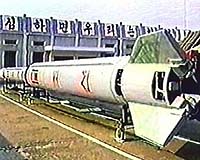
Taepodong Missile (Photo: Spacedaily)
North Korea on July 4 test-fired at least six missiles including a long-range weapon said to be capable of reaching Alaska. The long-range Taepodong-2 multi-stage missile apparently failed 40 seconds into its flight. Never-the-less the missiles tests provoked strong reactions from the United States and Japan as well as concern from South Korea.
The United Nations Security Council, at the request of Japan, adopted Resolution 1695 condemning the Democratic People's Republic of Korea's (DPRK) multiple ballistic missile test, demanding that the country suspend all related activities and requiring States to prevent the import or export of funds or goods that could fuel Pyongyang's missile or weapons of mass destruction programmes. (See UN Press Release SC 8778, July 15)
Prior to the test, US Representative Ms Madeleine Bordallo (Guam) introduced H. Con Res 432 calling on the Government of North Korea to cease all production of weapons of mass destruction, to cease proliferation of ballistic missiles, and to uphold its 1999 pledge to refrain from intercontinental ballistic missile testing. Resolution 432 also resolves to support United States allies, including South Korea, Japan, New Zealand, Australia, and others, threatened by North Korean provocations.
The North Korean missile tests were preceded by ballistic missile tests conducted in June by the United States and Russia and were followed by further missile tests in July by the United States and India. On June 14, the United States tested a Minuteman-III missile, firing it from Vandenberg Air Force Base to the US test range in the Pacific at Kwajelein Atoll. On June 30 Russia tested a Baluva missile launched from a submarine in the White Sea and landing over 5000Km away in Kamchatka. On July 10, India launched its new, long-range Agni III missile from the Orissa Coast which fell short of its intended target 1800 miles away, crashing into the Bengal Sea. Australian peace groups criticized the double standard stressing that “the US and Russia retain the ability to make the world uninhabitable, or at least to end civilisation, within less than an hour, and have several times come close to doing so by accident. The testing of ICBMs isn't just something the DPRK should not do: Nobody should be doing it.”
- Summit of Nobel Peace Laureates calls for peace and denuclearization of the Korean Peninsula.
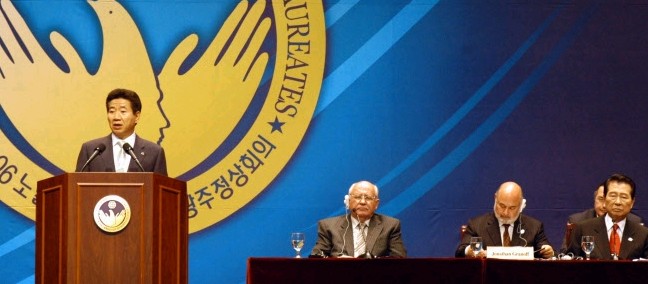
South Korean President Roh Mo-hyun speaking at the Nobel Peace Summit along with Mikhael Gorbachev, PNND Council Member Jonathan Granoff and former South Korean President Kim Dae Jung. (Photo: Chosun)
Nobel Peace Laureates, parliamentarians and other key civil society leaders meeting at the 6th Summit of Nobel Peace Laureates garnered considerable media attention in their call on both North Korea and the United States to take goodwill steps to revive the peace process and to achieve a denuclearized Korean peninsula.
The Summit, held in Gwangju South Korea from June 15-17, was hosted by former Soviet President Mikhael Gorbachev and former South Korean President Kim Dae Jung. The Summit provided substantial support for the 2000 South-North Declaration, thus helping ensure that the North Korean missile tests the following week did not derail the peace process.
For full report and media links see www.ipb.org and scroll down to “2006 SUMMIT OF NOBEL PEACE LAUREATES: Gwanju, South Korea”
- UK House of Commons to Vote on Remaining Nuclear Weapons System
UK House of Commons Leader Jack Straw announced on July 20 that Members of Parliament will be given the chance to vote on replacing the Trident nuclear weapons system, the UK’s only remaining nuclear weapons system. UK Prime Minister Tony Blair has previously promised a full debate on the issue but stopped short of pledging a vote. Mr Straw noted that it was "important" MPs had a say and said they would get a substantive yes or no vote - meaning they could in theory reject the plan. Mr Straw noted that it would be "inconceivable" for the government to press ahead with renewing Trident if MPs rejected it, however, he was confident there was majority backing on the Labour benches for Trident renewal.
The Campaign for Nuclear Disarmament (CND) welcomed the announcement but called for a full public debate on the issue before MPs vote on it - as promised last year by then defence secretary John Reid.
CND chairman Kate Hudson said "We would now like to see the commitment to the publication of a Green Paper outlining all options, including non-replacement, prior that vote taking place." (See MPs get 'veto' over new Trident, BBC News, July 20)
- Nuclear testing in the South Pacific – parliamentary actions
- Citizens and Parliamentarians nuclear test conference concludes with inauguration of commemoration site
On 2 July 2006 Oscar Temaru, President of French Polynesia, inaugurated a site to commemorate the 193 nuclear test explosions which destabilised the Pacific region and resulted in severe health and environmental problems from the radiation dispersed by the tests.
The site commemoration concluded a two day international conference linking scientists, parliamentarians, former workers of French nuclear test sites and non-governmental organisations from the Pacific, the United States and Europe.
The "memorial site" is built in the shape of a traditional "paepae" with five stones symbolising the five Polynesian archipelagos and the ceremony largely included traditional Polynesian dances and songs. "We could not erect a monument symbolising a reconciliation with France as France is still refusing to acknowledge its responsibility" pointed out Roland Oldham, President of Moruroa e tatou.
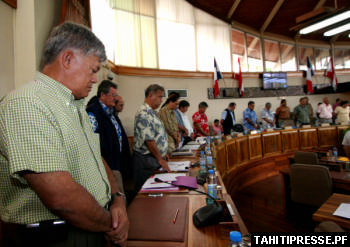
French Polynesia President Oscar Temaru leads a one minute silence in the National Assembly in honour of victims of nuclear testing.
(Photo: Tahiti Presse)
Surrounded by members of his government and by a large number of representatives of the Assembly of French Polynesia, President Temaru thanked experts and parliamentarians from Australia, New Zealand, the United States, France, Japan and Fiji and encouraged them to disseminate in their respective countries and before their governments the call of the Polynesian people for the truth to be told about the consequences of nuclear testing on the populations and their environment and for justice to be done to the victims.
The conference heard testimonies from many affected by the nuclear testing – widows of test workers, mothers of deformed babies, military personnel with recurring health problems, civilians with unusual diseases not known prior to the tests.
French Senator Helen Luc notes that “All these testimonies, all these actions encourage me to do be more active in seeking redress from the French government for the ongoing damage caused by French nuclear testing. I plan to hold the government accountable as soon as the French Parliament reopens.”
For further information see:
- UK House of Commons EDM on nuclear testing compensation
On May 11 Keith Vaz MP (UK House of Commons) introduced Early Day Motion 2142 (endorsed by 41 members of the House of Commons) entitled COMPENSATION TO THE VICTIMS OF SOUTH PACIFIC NUCLEAR TESTS. The EDM “calls on the Ministry of Defence to provide fair compensation and a full apology to service veterans who were deliberately exposed to dangerous levels of radiation during a series of British nuclear tests in South Pacific during the 1950s and 1960s; notes new research carried out by Dr Al Rowland of Massey University, New Zealand, which provides further strong evidence of linkage between exposure to nuclear tests and medical conditions which developed later; and further notes that these veterans and their children have suffered from appalling medical conditions directly related to radiation poisoning over the past 50 years.”
- New Proposals to deal with Weapons of Mass destruction: Report of the WMD Commission
On 1 June the Weapons of Mass Destruction Commission (WMDC) Chairman Dr. Hans Blix presented the Commission report "Weapons of Terror" to the United Nations Secretary-General Kofi Annan in New York. The report contains sixty concrete proposals on how the world could be freed of nuclear, biological and chemical weapons. (See WMDC Press Release New proposals to reduce threats by weapons of mass destruction. Full Report: Weapons of Terror.)
On June 7 the Global Security Institute (parent body for PNND) organized a series of meetings for Hans Blix in the US Congress to present the report and discuss specific recommendations which could help deal with nuclear weapons threats, including the Iranian uranium enrichment issue and how to address proliferation problems without recourse to the use of force. Hans Blix met with House Democrats hosted by Rep Ed Markey (MA), House Republicans hosted by Rep Chris Shays (CT) and members of the Senate Armed Services Committee hosted by Senator Warner (VI) Chair of the Committee.
Blix was well received by all Congress-members he met. There was general agreement amongst the Congress members that national governments and international institutions can be more effective in reducing nuclear dangers and preventing proliferation by working together. Blix provided concrete examples of how National Technical Means available to States (such as satellite surveillance and information interception) can complement the inspection, monitoring and enforcement methods open to international institutions such as the International Atomic Energy Agency, the Comprehensive Test Ban Treaty Organisation and the Security Council.
Blix has traveled (and continues traveling) to other countries including Canada, the UK and Russia to present the report to governments, the media, NGOs and parliaments.
- World Court Advisory Opinion on nuclear weapons – European Parliament and the UK House of Commons
On 8 July 1996 the International Court of Justice delivered an Advisory Opinion affirming that the threat or use of nuclear weapons was generally illegal and that there is an obligation to achieve complete nuclear disarmament.
10 years later, with minimal progress on neither the reduction of nuclear threat and use doctrines or on nuclear disarmament, the nongovernmental organizations that initiated the 1996 case (International Association of Lawyers Against Nuclear Arms, International Peace Bureau and International Physicians for the Prevention of Nuclear War) hosted a conference in the European Parliament to consider how the ICJ opinion could be implemented and whether a follow-up opinion should be sought from the Court on compliance with the opinion.
The conference was hosted by Members of the European Parliament Caroline Lucas and Gisela Kallenbach, and included parliamentarians, a former judge from the ICJ, international law experts, and activists who have used the ICJ opinion in domestic court cases against nuclear weapons.
For further information see:
On 22 June 2006 Jeremy Corbyn MP, member of the UK House of Commons, introduced Early Day Motion 2435 signed by 36 other members recalling the advisory opinion delivered by the International Court of Justice (ICJ) on 8th July 1996 that the use or threatened use of nuclear weapons is illegal in international law; welcoming the visit by Dr Tadatoshi Akiba, Mayor of Hiroshima, to the House of Commons on 3rd July to mark the 10th anniversary of the ICJ advisory opinion; and urging the Government to signal its commitment to fulfill its nuclear disarmament obligations under the Nuclear Non-Proliferation Treaty by not proceeding with any proposal to replace the Trident nuclear submarine system.
- Tactical nuclear weapons in Europe
Momentum has been growing in Europe and European parliaments on the removal of US tactical nuclear weapons from the territories of European countries. Information on the number of US tactical nuclear weapons deployed in Belgium, Germany, Italy, Netherlands, Turkey and the United Kingdom is classified and not even available to the parliaments of these countries. However, the Natural Resources Defence Council released a report in February 2005 (US Nuclear Weapons in Europe) which used declassified documents obtained under the Freedom of Information Act, military publications, commercial satellite imagery, and other documents indicating that up to 480 US nuclear weapons remain deployed in Europe most likely targeted against Russia, Iran and Syria. This is nearly twice the number previously suspected by most analysts to be deployed in Europe (See PNND Notes, January-February 2006).
Resolutions have been adopted (without opposition) in the Belgian Senate and the House of Deputies calling for action to remove US tactical nuclear weapons from Europe.
In August, parliamentarians from European countries hosting US tactical nuclear weapons will be joining Citizen Weapons Inspection Teams which will attempt to visit suspected nuclear weapons deployment sites to ascertain whether nuclear weapons are being deployed in potential violation of the Non-Proliferation Treaty and the International Court of Justice Advisory Opinion on the Legality of Nuclear Weapons.
In an attempt to open up nuclear weapons deployment in Italy to parliamentary oversight, Senator Francesco Martone will hold a press conference in the Italian Senate prior to joining an inspection at the United States Air Force Base in Aviano, Italy. It is suspected that 50 B61 type atom bombs are deployed at Aviano base and these could be available for use by Italian military in time of war under nuclear sharing arrangements with the US (See Announcement of Inspection to the Commanding Officer, USAF Base at Aviano). In addition, Senator Martone has introduced a resolution into the Italian Senate calling on the removal of US nuclear weapons from Italy and the end of nuclear sharing arrangements between the US and Italy.
Angelika Beer and Caroline Lukas (Members of the European Parliament) have drafted a Written Declaration on the Withdrawal of US Nuclear Weapons from European Territory, which is currently gathering endorsers from other MEPs in order to achieve majority support when the parliament reconvenes after the northern summer. MEPs wishing to endorse please contact Angelika BEER.
- US Congress Resolution on nuclear abolition
At the World Peace Forum in Vancouver, US Congress member Dennis Kucinich released a draft resolution calling on the President of the United States to initiate negotiations leading to the abolition of nuclear weapons. Representative Kucinich, speaking on June 25 to the annual general meeting of Abolition 2000, a network of over 2000 organisations working for nuclear disarmament, noted that only the prohibition and elimination of nuclear weapons would prevent a catastrophic use by terrorists, unstable States or by nuclear weapons States whether by miscalculation, accident or intention.
The draft resolution cites the WMD Commission Report’s conclusion that ‘‘So long as any state has nuclear weapons, others will want them. So long as any such weapons remain, there is a risk that they will one day be used, by design or accident. Any such use would be catastrophic,’’ and notes that “the Model Nuclear Weapons Convention, circulated by the United Nations, demonstrates the feasibility of achieving the global elimination of nuclear weapons.”
- Middle Powers Initiative hearings in Canadian House of Commons
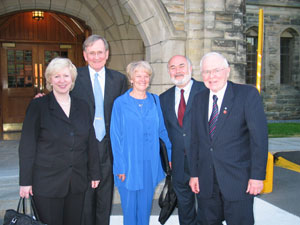
MPI delegation to the Canadian Foreign Affairs Committee, Kim Campbell, Tom Graham, Alexa McDonough, Jonathan Granoff and Douglas Roche.
On 13 June a high-level delegation organized by the Middle Powers Initiative provided formal testimony on nuclear nonproliferation and disarmament to the Canadian House of Commons Foreign Affairs Committee. The delegation included the Rt Hon Kim Campbell (former Prime Minister of Canada), Senator Emeritus Douglas Roche (Chair of the PNND Council), Ambassador Thomas Graham (Chair of the US Bipartisan Security Group) and Jonathan Granoff (President of Global Security Institute).
The testimony supported Canada’s positive role in promoting nuclear nonproliferation and disarmament, and prompted cross party discussions on the need for Canada to take further initiatives in this regard due to the increasing dangers of nuclear weapons use by terrorists, unstable governments or event the nuclear weapon States themselves.
The delegation noted key initiatives in which Canada could play a role including conclusion of a fissile materials treaty, entry-into-force of the Comprehensive Test Ban Treaty, encouraging the US and Russia to take all nuclear forces off launch-on-warning and high-alert (readiness for use) status, and working with like-minded States to further develop technologies and mechanisms for verifying nuclear disarmament.
- NATO Parliamentary Assembly Report on Iran
At the 2006 Spring Session of the NATO Parliamentary Assembly, Diana Strofova (Slovakia), Rapporteur for the NATO PA working group on Iran, tabled its report Nuclear Policy of Iran. The aim of the report was to assist “The Euro-Atlantic community, which our Assembly represents…to develop a clear and unified strategy towards Iran's nuclear programme. Such a political strategy should be based on a sound and sober understanding of the technological characteristics of this programme, in order to avoid certain myths that may lead to ill-founded decisions. Therefore, the goal of this report is to present a condensed overview of Iran's advancements in nuclear fuel cycle development, attempting to provide NATO legislators with a background for their political judgement.”
The report emphasized that the Iranian situation cannot be viewed in isolation but that “Both nuclear- and non-nuclear-weapons states need to live up to their parts of the NPT bargain: nuclear disarmament and the peaceful exploitation of nuclear energy.”
The report called on Iran to revive its comprehensive cooperation with the International Atomic Energy Agency, based on the Additional Protocol. However, the working group did not agree with IAEA Director Dr. ElBaradei that “the patience of the international community is running out.” Instead the working group “is convinced that there is still time and room to try to engage Iran into cooperation, and avoid drastic measures and confrontation.”
- Article VI Forum
In October 2005 the Middle Powers Initiative established the Article VI Forum to bring likeminded countries together to explore and develop the legal, technical and political elements required to achieve and sustain a nuclear weapons free world. UN representatives of 28 States participated in the Inaugural Article VI Forum which was held at the United Nations in New York on 3 Oct 2005. The Second Article VI Forum, which was held in the Hague on 2-3 Mar 2006, brought together representatives from 21 States and a number of key NGOs and included two former prime ministers – Ruud Lubbers of the Netherlands and Kim Campbell of Canada. The Third Article VI Forum, held at the United Nations in New York on 8 June 2006, was hosted by the Chair of the UN General Assembly Disarmament Committee South Korean Ambassador Choi Young-jin.
Parliamentary engagement in the Article VI Forum process is vital in order to provide ideas for likeminded States and to support and encourage governments to become more active in building the elements for a nuclear weapons free world. As such, parliamentary participation will be increased at the next Article VI Forum which will be held in Ottawa September 28-29 hosted by the Canadian Department of Foreign Affairs and International Trade.
- PNND Council established
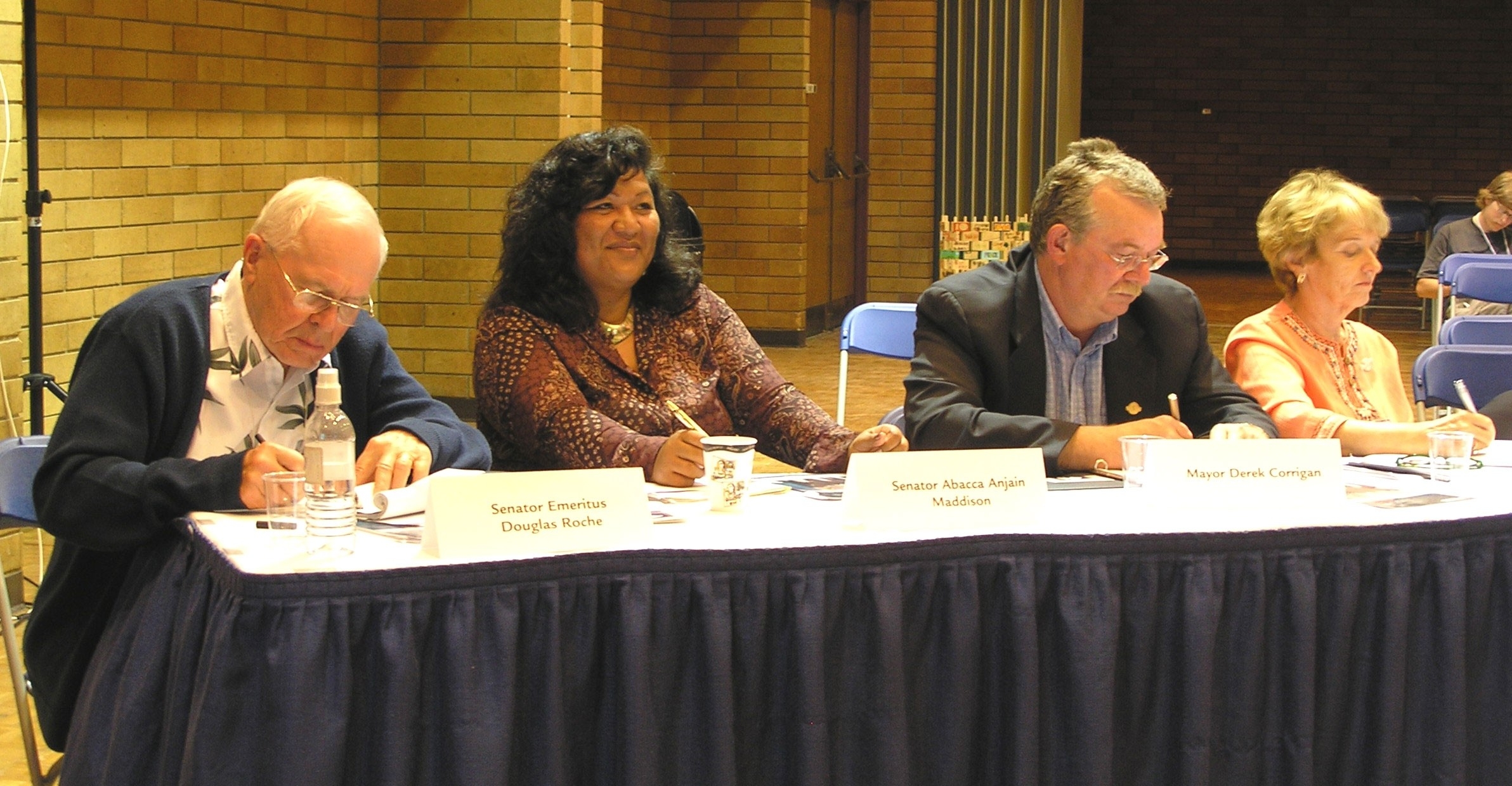 |
|
Senator Douglas Roche, Senator Abacca Anjain Maddison, Mayor Derek Corrigan and Alexa McDonough at the PNND Assembly in Vancouver, Canada. |
|
The Parliamentarians for Nuclear Non-proliferation and Disarmament established an interim PNND Council at its first annual meeting in Vancouver June 23. The PNND Council comprises parliamentary representatives from countries in which PNND is active or well established, as well as representatives from the Middle Powers Initiative (which founded PNND) and the Global Security Institute (which is PNND’s fiscal parent). Its role is to assist in the promotion of PNND, provide advice on areas/initiatives/issues for PNND focus and help organize the PNND Assembly. The interim PNND Council will be chaired by Senator Emeritus Douglas Roche (Canada) and its current members include:
Senator Lyn Allison (Australia)
Senator Abacca Anjain Maddison (Marshall Islands)
Raphael Chegeni MP (Tanzania)
David Coltart MP (Zimbabwe)
KONO Taro and SUEMATSU Yoshinori (co-representatives, Japan)
Lotta Hedstrom MP (Sweden)
Sergei Kolesnikov MP (Russia)
Hallgeir Langeland MP (Norway)
Lee Mi-Kyung MP and Kwon Young-ghil MP (co-representatives Republic of Korea)
Senator Francesco Martone (Italy)
Alexa McDonough MP (Canada)
Senator Dulce María Sauri Riancho (Mexico)
Hon Nick Smith MP (New Zealand)
Uta Zapf MP (Germany)
Jonathan Granoff (GSI Representative)
Senator Emeritus Douglas Roche (MPI Representative)
- In memorium: PNND Member Tynychbek Akmatbayev
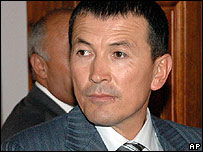
PNND regrets to inform you of the untimely death of one of our members in Kyrgyzstan. MP Tynychbek Akmatbayev was shot to death by inmates at Moldovanovka prison during a visit to investigate unrest over poor living conditions in the prison. PNND extends its condolences to his family and friends. For more information see http://news.bbc.co.uk/1/hi/world/asia-pacific/4395106.stm
|


